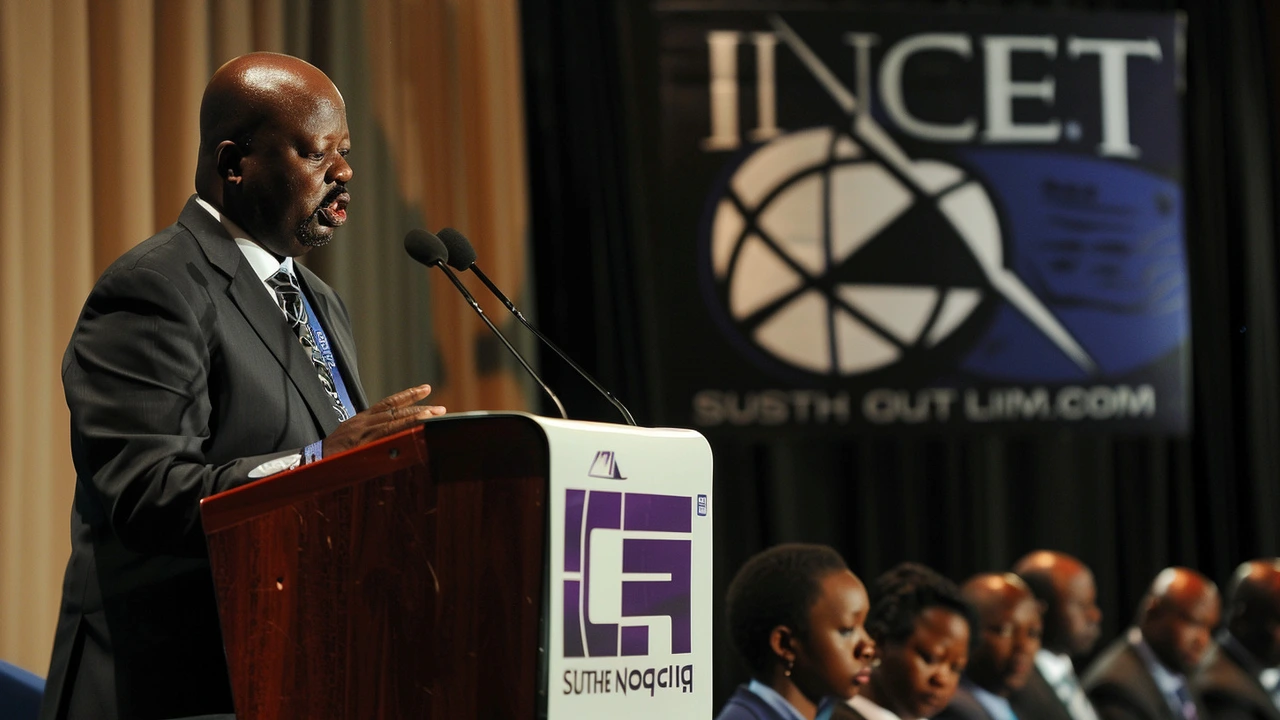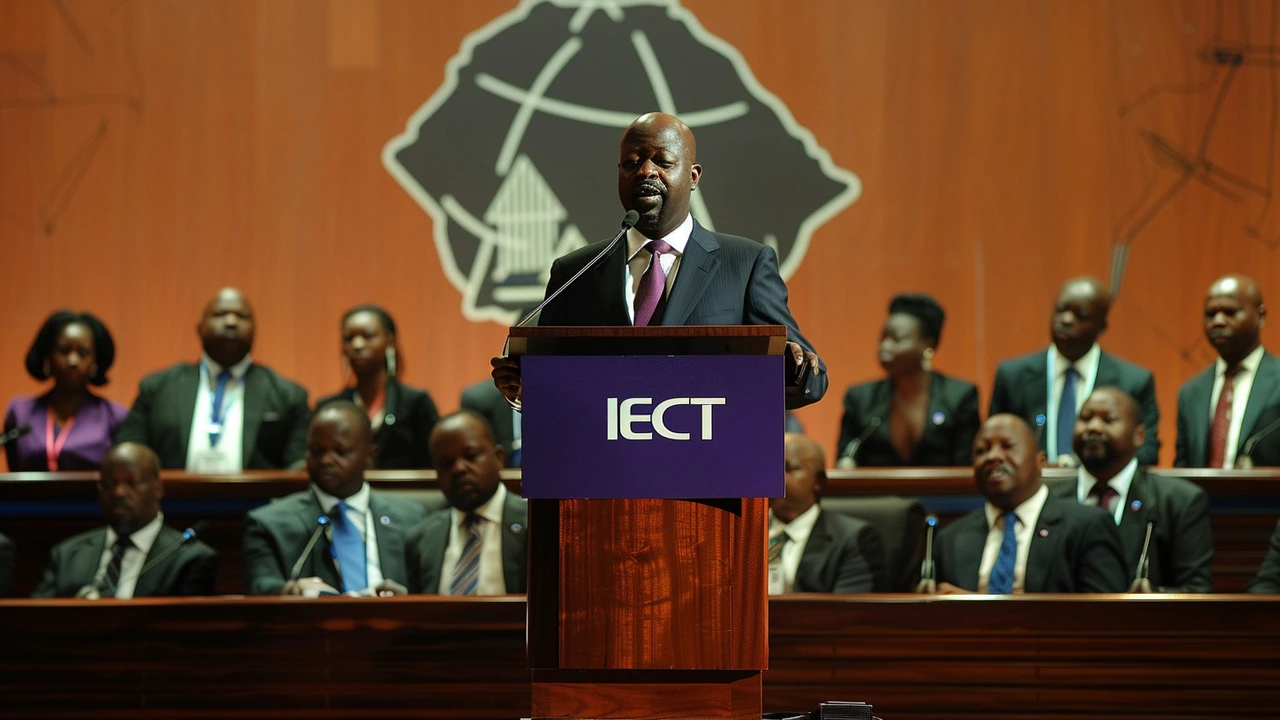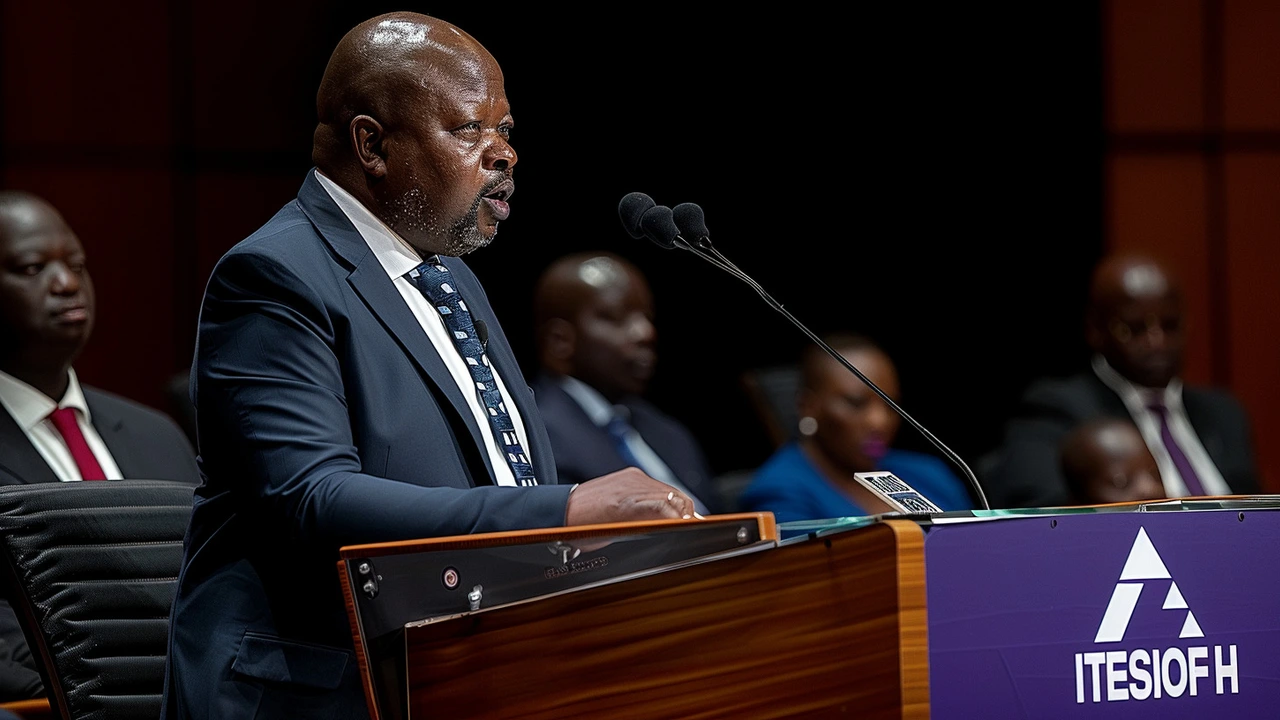2024 Elections Update: Special Vote Home Visits Ongoing, Says IEC
 May, 29 2024
May, 29 2024
2024 Elections Update: Special Vote Home Visits Ongoing, Says IEC
In a recent media briefing, Sy Mamabolo, the CEO of the Independent Electoral Commission (IEC), shed light on several significant aspects concerning the conduct of the 2024 elections. One of the focal points of the briefing was the ongoing home visits for special votes. These special votes are particularly crucial for elderly and frail citizens who may face difficulties in reaching the designated voting stations. According to Mamabolo, IEC officials are diligently working to ensure that every eligible vote is cast, even if it means going door-to-door.
During the briefing, Mamabolo emphasized that the initiative is a testament to the IEC's commitment to inclusivity and accessibility in the voting process. It's important to note that the elderly population often constitutes a significant segment of the electorate, and their participation is vital for a holistic democratic process. IEC teams are spread out across the country, equipped with the necessary tools and training to assist these voters.
An essential piece of information that Mamabolo shared was that voters who, for any reason, missed their opportunity to cast a special vote are not out of options. These individuals still have a chance to participate in the election by heading to their designated voting station on Wednesday. This flexibility ensures that no vote goes uncounted and reinforces the IEC's commitment to a fair and comprehensive electoral process.
This year's election also stands out due to the impressive numbers reported by Mamabolo regarding the processed votes. By the afternoon of the briefing day, a staggering 937,000 votes had already been processed. This figure is not only a notable increase from the previous election but also signals a potential improvement in voter turnout for the subsequent voting days. Higher voter participation is a positive indicator of a functioning democracy, reflecting the electorate's interest and engagement in the governance process.
Extended Efforts for Voter Participation
Ensuring that every eligible voter has the chance to cast their ballot is not just a goal but a pillar of democratic integrity. The IEC's approach to conducting home visits for special votes is a significant step towards achieving this goal. These visits are particularly beneficial for those who are unable to visit voting stations due to health or mobility issues. By providing this service, the IEC is upholding the principle that every vote counts, irrespective of logistical challenges.
The process involves IEC officials visiting the homes of those who have registered for special votes. These officials are trained to ensure that the voting process is conducted in a manner that is both accessible and confidential. The presence of trained officials also mitigates the risk of any irregularities or malpractices, thereby upholding the integrity of the electoral process. This meticulous approach highlights the IEC's dedication to a transparent and fair election.
Moreover, this initiative also serves to remind the general public of the importance of participating in the electoral process. It underscores the idea that each vote holds value and that the IEC is willing to go the extra mile to ensure that everyone has the opportunity to exercise their democratic right. This message resonates well with the broader electorate, potentially motivating more citizens to participate in future elections.

Voter Turnout: A Sign of Democratic Health
The number of processed votes, as reported by Mamabolo, is an encouraging sign for the health of the democracy. A higher voter turnout is often correlated with greater public trust and engagement in the democratic process. It reflects a population that is not only aware of its rights but also eager to influence the direction of governance through their votes. The fact that 937,000 votes were processed by the afternoon indicates a robust voter response and suggests that the overall turnout might surpass previous records.
This increase in voter turnout could be attributed to several factors. Firstly, the IEC's efforts to make voting more accessible, such as through home visits, have likely played a significant role. Secondly, public awareness campaigns and media coverage surrounding the elections may have helped galvanize voters. Lastly, the political climate and the issues at stake this election may have driven more individuals to participate in the voting process.
Higher voter engagement is beneficial for the political landscape as it ensures that the elected representatives truly reflect the will of the people. It also adds legitimacy to the electoral process and can lead to more stable governance. As more people participate in elections, it becomes harder for any entity to undermine the democratic process, thereby strengthening the overall political framework.
Challenges and the Way Forward
While the current statistics and efforts by the IEC are commendable, there are still challenges that need to be addressed. One of the primary concerns is ensuring that all votes, including those cast during home visits, are counted accurately and promptly. Transparency in this process is crucial to maintaining public trust in the electoral system.
Another challenge is logistical. Given the vast geographical spread and varying accessibility levels across different regions, ensuring timely and efficient conduct of home visits can be taxing. The IEC needs to continuously improve its strategies and allocate resources effectively to manage this task. Moreover, training and equipping officials for these visits is essential for maintaining the credibility of the process.
The role of technology in elections is another area that demands attention. From voter registration to vote counting, technological advancements can significantly streamline the process. However, the adoption of technology also brings with it concerns over cybersecurity and data privacy. Balancing these aspects is critical for the future of efficient and secure elections.
Looking ahead, the IEC's current efforts set a strong precedent for future elections. The focus on inclusivity, accessibility, and transparency is commendable. By continuing to build on these principles and addressing the challenges head-on, the IEC can ensure a stronger and more resilient democratic process. The ongoing initiatives provide a template for other electoral bodies worldwide, demonstrating that with dedication and innovation, it is possible to make every vote count.

Conclusion
The ongoing home visits for special votes are a clear indication of the IEC's commitment to ensuring that every citizen has the opportunity to participate in the democratic process. The significant number of votes processed so far is a promising sign of robust voter engagement. As the election day approaches, it will be crucial to maintain the momentum and address any challenges that arise. With continued efforts and public participation, the 2024 elections have the potential to be a milestone in the country's democratic journey.

Dee Boyd
May 29, 2024 AT 18:55From a procedural integrity standpoint, the IEC's home‑visit protocol exemplifies a systematic approach to voter enfranchisement, leveraging operational redundancy and logistical elasticity to mitigate disenfranchisement risk.
Carol Wild
June 2, 2024 AT 06:15The media briefing ostensibly showcases a benign administrative update, yet beneath the veneer lies a coordinated narrative engineered to distract the electorate from systemic manipulation. Every statistic cited-937,000 processed votes, unprecedented turnout projections-is filtered through a curated lens that normalizes incremental power consolidation. By glorifying the IEC's "home visits," the establishment tacitly endorses a surveillance apparatus embedded in private domiciles, eroding the sanctity of the secret ballot. Historical precedent suggests that such outreach is rarely altruistic; rather, it functions as a conduit for political operatives to identify, coerce, or reward compliant voters. Moreover, the timing of this announcement-mid‑campaign, when opposition momentum is critical-signals a strategic deployment of resources aimed at reshaping voter perception. The language employed is deliberately soothing, employing jargon such as "inclusive" and "accessibility" to mask the underlying agenda of voter conditioning. One must question why the IEC, an ostensibly neutral entity, chooses to highlight logistical prowess instead of emphasizing transparent audit mechanisms. The omission of independent oversight details is conspicuous and warrants scrutiny. In parallel, parallel narratives about technological upgrades in vote counting are conspicuously absent, despite widespread concerns about cyber‑intrusion. This selective disclosure creates an informational vacuum that can be readily filled by partisan mythmaking. The elevated vote count itself could be symptomatic of ballot stuffing, a tactic notoriously employed in comparable jurisdictions during pivotal elections. Consider also the logistics: deploying officials door‑to‑door across a sprawling nation requires substantial funding, raising the specter of undisclosed budget allocations. Such financial opacity aligns with patterns observed in previous electoral cycles where opaque contracts facilitated patronage networks. The emphasis on "elderly and frail" voters, while morally resonant, conveniently sidesteps the broader demographic that might dissent from the ruling coalition. By casting the vulnerable as a monolithic bloc, the narrative precludes nuanced analysis of their political leanings. Finally, the framing of the IEC's actions as a triumph of democratic health conveniently diverts attention from substantive policy debates that truly shape voter intent. In sum, the briefing is less an update and more a meticulously crafted instrument of electoral engineering.
Rahul Sharma
June 5, 2024 AT 17:35Looking at the IEC's outreach, there are several operational benchmarks that could be leveraged to improve future electoral cycles; first, the deployment density of mobile polling units should be calibrated against regional demographic data; second, training modules must incorporate multilingual support to address linguistic diversity; third, data integrity protocols need to include real‑time hashing of ballot metadata; fourth, the scheduling algorithm for home visits ought to factor in traffic patterns to reduce officer fatigue; fifth, a transparent dashboard accessible to civil society would bolster public trust; sixth, cross‑verification with national identity registries can minimize duplicate voting; seventh, post‑visit audits should be randomized to ensure compliance; eighth, feedback loops from voters can inform continuous process refinement; ninth, budgeting for these initiatives must be disclosed in quarterly reports; tenth, inter‑agency coordination with health services can identify at‑risk voters earlier; eleventh, contingency plans for extreme weather events should be embedded in the operational playbook; twelfth, leveraging geospatial analytics can optimize route planning; thirteenth, establishing a whistle‑blower hotline for irregularities encourages accountability; fourteenth, integration with electronic voting pilots can streamline counting; fifteenth, stakeholder workshops prior to election day foster collaborative ownership of the process.
Emily Kadanec
June 9, 2024 AT 04:55they really need to stop overcomplicatin this stuff.
william wijaya
June 12, 2024 AT 16:15While I appreciate Rahul's systematic breakdown, the human element can’t be reduced to a checklist; many seniors value the personal touch of a familiar face, and that relational trust often outweighs procedural perfection.
Lemuel Belleza
June 16, 2024 AT 03:35Honestly, the whole home‑visit thing feels like a bureaucratic overkill that will just waste resources while the real issues go unaddressed.
faye ambit
June 19, 2024 AT 14:55In contemplating the broader implications, one might reflect on how civic rituals intertwine with collective identity, and how each outreach effort subtly reinforces the social contract between the state and its constituents.
Subhash Choudhary
June 23, 2024 AT 02:15That's a thoughtful take, faye; it reminds us that beyond numbers, elections are about shared narratives that bind communities together.
Ethan Smith
June 26, 2024 AT 13:35From a practical perspective, ensuring that each special vote is logged accurately will be essential for post‑election audits and maintaining public confidence.
Evelyn Monroig
June 30, 2024 AT 00:55The IEC's so‑called "transparency" is just a front; behind the scenes, shadow networks are likely manipulating the data flow to guarantee a predetermined outcome.
Gerald Hornsby
July 3, 2024 AT 12:15Drama aside, every vote counts-unless the system decides otherwise. 😉
Hina Tiwari
July 6, 2024 AT 23:35I think its important to balence teh technolgy with human oversight so we dont lose trust in the process.
WILL WILLIAMS
July 10, 2024 AT 10:55Love the energy behind the IEC's push-let's keep the momentum high and get everyone to the polls!
Barry Hall
July 13, 2024 AT 22:15All stakeholders should stay engaged; collaborative vigilance is key to a credible election.